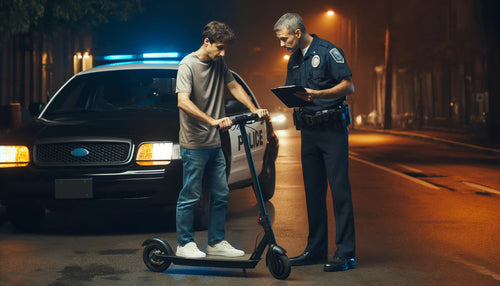Have you ever felt the thrill of freedom while zipping around town on a scooter? It’s fun, practical, and a great way to beat the traffic.
But before you hop on and ride away, there’s a crucial question you might be asking yourself: Do you need a driver’s license for that scooter? Understanding the rules can be a bit tricky, especially since they vary depending on where you live.
But don’t worry; we’ve got you covered. We’ll dive into the specifics and ensure you’re well-informed. Stick around, because knowing the answer could save you from unexpected fines and help you ride with peace of mind.
Scooter Types And Regulations
Understanding scooter regulations can be tricky. Different types of scooters have different rules. Knowing these rules is important. It helps you avoid fines and stay safe. This section explores different scooter types and their regulations. Let’s dive in!
Electric Scooters
Electric scooters are popular in urban areas. They’re eco-friendly and easy to use. Do you need a license for them? It depends on where you live. In some places, you don’t need a license. In others, a basic driver’s license is required. Always check local laws before riding.
Gas-powered Scooters
Gas-powered scooters are faster than electric ones. They often require a driver’s license. Some regions classify them as motorcycles. This means you need a motorcycle license. Other places might only require a standard driver’s license. Always verify the rules in your area.
Moped Variations
Mopeds are a mix of bicycles and scooters. They have small engines and are easy to ride. Do you need a license for mopeds? Again, it varies. Some areas require a moped permit. Others might ask for a regular driver’s license. Make sure you understand local moped laws.
License Requirements By Region
Scooter license requirements vary by region. Some places demand a driver’s license while others do not. Always check local rules for accurate information.
Navigating the world of scooter licenses can be confusing, as requirements vary widely depending on where you are. Understanding these differences is crucial, especially if you’re planning to ride a scooter in a different region. Let’s break it down by region so you can hit the road with confidence.
United States
In the United States, license requirements for scooters can differ from state to state. Some states require a motorcycle license, while others only need a regular driver’s license. For instance, in California, you need a motorcycle license if your scooter exceeds 50cc. However, in Florida, a regular driver’s license suffices for scooters under 50cc. Knowing the local laws can save you from hefty fines or legal troubles.
European Union
The European Union has its own set of rules regarding scooter licenses, which can also vary by country. Generally, a standard driving license (category AM) covers mopeds and scooters with a speed of up to 45 km/h. In countries like France, riders as young as 14 can obtain an AM license. However, in Germany, you must be at least 16. If you’re planning a European road trip, it’s essential to check each country’s specific requirements before hopping on your scooter.
Asia-pacific
The Asia-Pacific region presents a diverse landscape of scooter regulations. In some countries, like Vietnam, scooters are a primary mode of transport, and having a motorcycle license is mandatory for all engine sizes. On the other hand, in Japan, you need a specific moped license for scooters under 50cc. If you’re an expat or a tourist, understanding these rules can enhance your travel experience and keep you on the right side of the law. Do you know the requirements for riding a scooter in your region? It’s crucial to get acquainted with them to ensure a smooth and legal ride. Remember, the rules are there to keep you safe. Enjoy the freedom of the ride, but make sure you’re licensed to enjoy it!
Age Restrictions For Scooter Riders
Scooter riders often wonder about the need for a driver’s license. Age restrictions vary by region and scooter type. Checking local laws helps determine if a license is required for riding.
Scooters have surged in popularity as a fun and convenient mode of transportation. However, not everyone can hop on and ride away. Age restrictions play a crucial role in determining who can legally ride a scooter. Understanding these restrictions is vital, especially if you’re considering purchasing a scooter for yourself or a family member.
Minimum Age
Many regions have specific age requirements for scooter riders. Usually, you need to be at least 16 years old to ride a scooter independently. In some places, the minimum age might be slightly higher, around 18, to ensure riders are more mature and responsible. It’s essential to check local regulations before getting excited about that scooter ride.
Parental Consent
If you’re below a certain age, parental consent might be required to ride a scooter legally. This often applies to younger teens eager to embrace their independence. Parents may need to sign a form or be present during the rental or purchase process. This involvement ensures that parents are aware of the risks and responsibilities involved. Parental consent acts as a safeguard, ensuring that young riders are prepared and supervised appropriately. Have you ever had to ask your parents’ permission for something you were passionate about? This process might remind you of that. Understanding these age-related rules isn’t just about adhering to laws; it’s about safety and ensuring a smooth ride without legal hiccups. So, are you ready to check the rules and hit the road?

Credit: www.youtube.com
Safety And Training Courses
Riding a scooter can be fun and convenient. But safety should always come first. Attending safety and training courses is important. These courses can teach essential skills. They help ensure riders are well-prepared for the road. Whether you’re a beginner or experienced, training can boost confidence and safety.
Basic Riding Skills
Understanding basic riding skills is crucial for scooter riders. These skills cover starting, stopping, and turning. Riders learn how to balance properly. Courses often include practical sessions. This hands-on experience is valuable. It builds muscle memory and confidence. Knowing the basics can prevent accidents.
Advanced Safety Training
Advanced safety training offers deeper insights. These courses teach defensive riding techniques. Riders learn to anticipate dangers. Courses often include emergency maneuvers. They focus on avoiding potential hazards. Advanced training can reduce the risk of accidents. It equips riders with the skills for safe riding.
Insurance And Liability
Riding a scooter can be fun and convenient. But understanding insurance and liability is essential. Knowing the basics helps protect you on the road. Let’s explore what you need to know.
Coverage Options
Scooter insurance can vary by state and policy. Basic coverage often includes liability insurance. This covers damage or injury to others. Some policies offer additional protection. Consider theft, collision, and personal injury coverage.
Check with insurance providers for available options. Compare policies to find the best fit for your needs. Having proper coverage is crucial for peace of mind.
Legal Implications
Legal requirements for scooter insurance differ by region. In some places, having insurance is mandatory. Riding without it can lead to fines or penalties. It’s important to understand local laws.
Being aware of your liability is key. If an accident occurs, you may be held responsible. Insurance helps manage these risks. Stay informed to avoid legal troubles.
Environmental Impact Considerations
Choosing a scooter can be a smart move for the environment. Scooters generally use less fuel than cars. This means fewer emissions into the air. With growing concerns about pollution, scooters are gaining popularity. They offer a cleaner way to travel.
Emission Standards
Every vehicle, including scooters, has emission rules to follow. These standards limit the harmful gases they release. Scooters often meet these rules better than cars. They produce less carbon dioxide and other pollutants. This helps keep the air cleaner and healthier.
Eco-friendly Alternatives
Electric scooters are a great choice for green transport. They do not need gasoline. They run on batteries and produce no emissions. This makes them better for the environment. Riding an electric scooter can reduce your carbon footprint.
Some scooters use hybrid technology. These combine electric power with fuel. Hybrids use less fuel than regular scooters. This makes them a cleaner option. Consider these eco-friendly choices when buying a scooter.
Future Trends In Scooter Licensing
Scooter licensing rules are evolving with the rise of electric scooters. Some regions require a driver’s license, while others have relaxed regulations. Understanding local laws is essential for safe and legal riding.
Future trends in scooter licensing are rapidly evolving. With the rise in scooter usage, understanding licensing requirements becomes crucial. As scooters gain popularity, regulations adapt. This section explores future trends in scooter licensing.
Technological Advances
Technology is reshaping scooter licensing. Smart scooters offer real-time data. They track speed and location. Advanced features enhance safety. GPS systems provide navigation. Embedded sensors monitor scooter conditions. Connectivity features improve user experience. Automation aids in compliance checks. These advances simplify licensing processes. They ensure safer rides.
Regulatory Changes
Regulations are evolving to meet new demands. Authorities are reviewing scooter laws. Licensing criteria may change soon. Age and skill requirements are under consideration. Safety standards are being updated. Helmet usage might become mandatory. Regulations aim to protect riders. They ensure responsible scooter operation. Changes reflect growing scooter popularity. New policies prioritize public safety.

Credit: www.ktblegal.com

Credit: www.youtube.com
Frequently Asked Questions
Do I Need A License For A 50cc Scooter?
A license is often required for 50cc scooters. Regulations vary by state or country. Check local laws for specific requirements. Some regions may allow riding without a license if the scooter’s speed is limited. Always ensure compliance to avoid penalties.
Can I Ride A Scooter Without A License?
Riding a scooter without a license depends on local laws. Some areas allow it for low-speed scooters. Always verify with local authorities. Riding without a license can lead to fines and legal issues. It’s crucial to understand the regulations where you live.
Is A Scooter License Different From A Car License?
Yes, a scooter license is often different from a car license. Scooters may require a motorcycle endorsement. Requirements vary by region. Always check local regulations. Some areas may allow car license holders to ride scooters. Verify with your local DMV for clarity.
Do Electric Scooters Require A Driver’s License?
Electric scooters may not require a driver’s license in some areas. Regulations depend on speed and power. Check local laws for specific requirements. Riding without proper knowledge can lead to penalties. Always ensure compliance to avoid legal issues.
Conclusion
Scooter regulations can vary, so check local laws. Some places require a driver’s license. Others don’t. It’s crucial to understand the rules in your area. Safe riding should always be a priority. Helmets protect, and rules exist for a reason.
Following the law keeps you and others safe. Scooters offer a fun, efficient way to travel. But responsibility matters. Educate yourself on requirements. Ride with care and awareness. Your safety is important. Enjoy the ride, but stay informed. Knowing the rules ensures a smooth journey.



